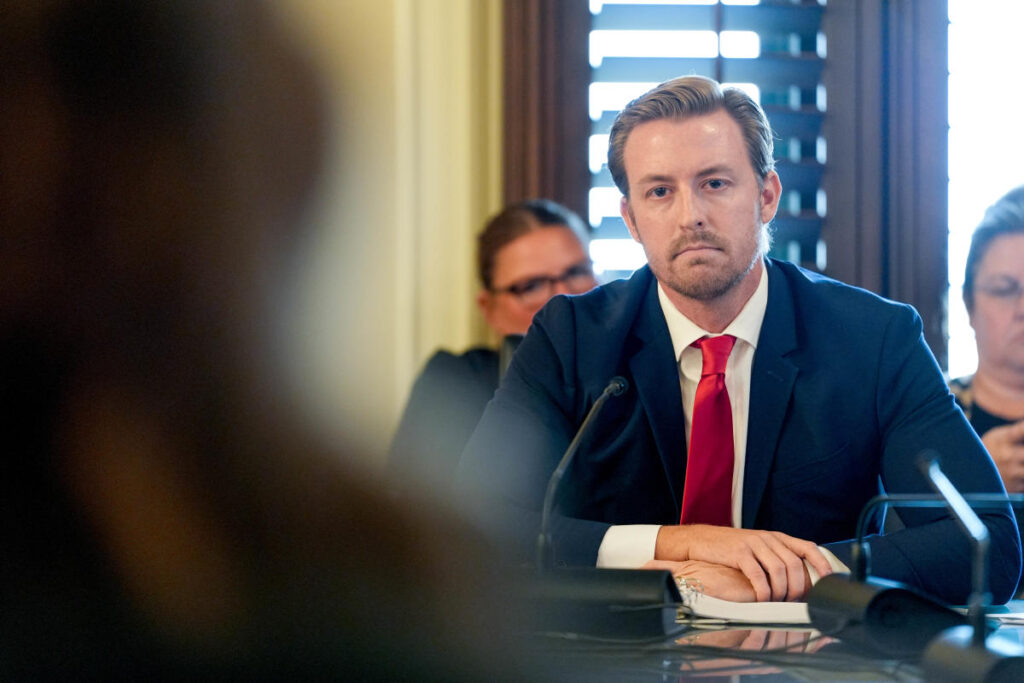Oklahoma State Schools Superintendent Ryan Walters is intensifying efforts to solicit nearly $475 million from Vice President Kamala Harris to reimburse the state for educating children whose parents are undocumented immigrants. His demand, which is rooted in an analysis that highlights the financial implications of illegal immigration on Oklahoma’s education system, has sparked significant backlash from lawmakers and community advocates. Critics argue that Walters’ request seeks to demonize Latino and immigrant communities while deflecting attention from ongoing issues related to his oversight of the state’s educational policies. In a formal letter to Harris, Walters cited a figure sourced from the Federation for American Immigration Reform (FAIR), a controversial group known for its anti-immigration stance, which has been labeled a hate group by the Southern Poverty Law Center.
Walters claims that the $474.9 million is justified due to the attributable costs of educating what he describes as “illegal immigrant children,” placing blame for these costs on Harris’s handling of U.S.-Mexico border policies. The response from the White House has been notably absent, raising questions about the feasibility and legal framework surrounding Walters’ demands. Critics, including community advocates and state representatives, highlight the problematic nature of equating the educational costs for children of undocumented parents with an obligation for federal reimbursement. They argue that many children attending Oklahoma schools are U.S. citizens and that public education funding is protected and mandated regardless of immigration status, referencing the 1982 Supreme Court decision in Plyler v. Doe.
Angelica Villalobos, the executive director of Immigrant Connexión, an immigrant-advocacy group, chastised Walters for what she considered gross misrepresentation of the facts surrounding education funding and immigration. Villalobos noted that the Constitution protects the rights of children born in the U.S. as citizens, and it is illegal to inquire about a student’s immigration status in public schools. Rep. Arturo Alonso-Sandoval echoed this sentiment, emphasizing that the superintendent’s responsibilities should include ensuring that all students, regardless of their backgrounds, receive quality education. He argued that casting undocumented families as a burden detracts from a more productive discourse on education policy and serves as a distraction from pressing issues in Oklahoma’s educational landscape.
Supporters of Walters’ rhetoric contend that undocumented families impose a financial strain on the education system. However, data from the Institute on Taxation and Economic Policy contradicts this narrative, revealing that undocumented immigrants in Oklahoma contributed over $227 million in state and local taxes in 2022 alone. Advocates argue that these tax contributions significantly support public services, including education. The discussion surrounding refunds for educational costs raises concerns about the willingness of policymakers to recognize the economic role of immigrant communities in sustaining local infrastructures.
Walters has consistently taken a hard stance against undocumented immigration, and his recent commentary aligns with broader Republican narratives regarding immigration control and fiscal responsibility. He highlighted the financial burden of educating Limited English Proficiency (LEP) students, reinforcing claims that the state faces challenges related to language acquisition and the need for additional resources in schooling. With over 6,000 LEP students in Oklahoma, he underscored the necessity for more certified teachers to assist these learners, framing it as a pressing issue for the state’s education system.
Critics like Nicole McAfee, executive director of Freedom Oklahoma, emphasize that discussions over undocumented immigrants require a more nuanced understanding of their contributions to society. They argue that Walters’ tactics aim to garner attention rather than genuinely engage in the complexities surrounding immigration and education. McAfee points out that the framing of young people as political pawns in these debates undermines their inherent right to education, irrespective of their family’s immigration status. Ultimately, the broader implications of Walters’ demands and actions reflect deep-rooted tensions surrounding immigration discourse in Oklahoma, spotlighting the intersection of education, policy, and community dynamics amidst ongoing national debates.

